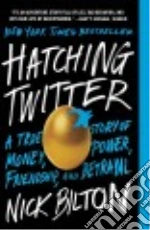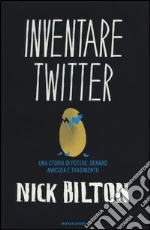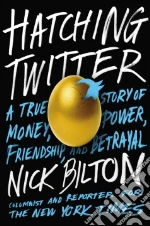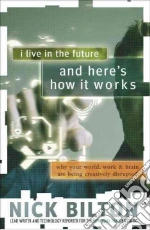 Libri di NICK BILTON su Unilibro.it) Libri di NICK BILTON su Unilibro.it)
|
|
1918 |
 Title :
American Kingpin
Title :
American KingpinAuthor: Nick Bilton Publisher: VIRGIN BOOKS € 12,90
|
 Title :
American Kingpin
Title :
American KingpinAuthor: Bilton Nick Publisher: Portfolio € 15,20
|
|
1917 |
 Title :
American Kingpin
Title :
American KingpinAuthor: Bilton Nick Publisher: Portfolio € 25,00
|
 Title :
American Kingpin
Title :
American KingpinAuthor: Nick Bilton Publisher: VIRGIN BOOKS € 15,40
|
 Title :
American Kingpin
Title :
American KingpinAuthor: Nick Bilton Publisher: VIRGIN BOOKS € 15,40
|
|
1914 |
 Title :
Hatching Twitter
Title :
Hatching TwitterAuthor: Bilton Nick Publisher: Portfolio A New York Times bestseller Ev told Jack he had to ?chill out” with the deluge of media he was doing. ?It’s bad for the company,” Ev said. ?It’s sending the wrong message.” Biz sat between them, watching like a spectator at a tennis match. ?But I invented Twitter,” Jack said. ?No, you didn’t invent Twitter,” Ev replied. ?I didn’t invent Twitter either. Neither did Biz. People don’t invent things on the Internet. They simply expand on an idea that already exists.” Despite all the coverage of Twitter’s rise, Nick Bilton of The New York Times is the first journalist to tell the full story?a gripping drama of betrayed friendships and highstakes power struggles. The four founders?Evan Williams, Biz Stone, Jack Dorsey, and Noah Glass?made a dizzyingly fast transition from ordinary engineers to wealthy celebrities. They fought each other bitterly for money, influence, publicity, and control as Twitter grew larger and more powerful. Ultimately they all lost their grip on it. Bilton’s unprecedented access and exhaustive reporting have enabled him to write an intimate portrait of four friends who accidentally changed the world, and what they all learned along the way. € 19,50
|
 Title :
Hatching Twitter
Title :
Hatching TwitterAuthor: BILTON NICK Publisher: Coronet HATCHING TWITTER - BILTON NICK - Coronet € 14,40
|
|
2014 |
 Title :
Inventare Twitter. Una storia di potere, denaro, amicizia e tradimento
Title :
Inventare Twitter. Una storia di potere, denaro, amicizia e tradimentoAuthor: Bilton Nick Publisher: Mondadori Fondata da un'estrosa squadra di fanatici della tecnologia, nel 2005 Odeo era una start up di San Francisco con tante belle speranze e poco futuro. Sotto le sue ceneri, però, covava un bizzarro e ambizioso progetto, destinato a trasformarsi ben presto - contro ogni ragionevole pronostico - in un'autentica rivoluzione nel modo di comunicare di milioni di persone in tutto il mondo. Nick Bilton, giornalista del 'New York Times', ricostruisce in queste pagine l'intera storia di Twitter, spiegandoci le ragioni del suo clamoroso quanto inaspettato successo. Attraverso una minuziosa indagine, compiuta esaminando carte ed e-mail riservate, e intervistando decine di persone che hanno assistito alla gestazione e alla nascita del social network a 140 caratteri, Bilton ci offre un vivido ritratto dei suoi quattro inventori: Evan Williams, il tranquillo ragazzo di campagna che aveva già cambiato il volto di Internet diffondendo, e rendendo molto remunerativo, l'uso dei 'blog'; Jack Dorsey, che dopo essersi tagliato i dreadlocks azzurri contribuì a elaborare l'idea originale ed è ora acclamato come il successore di Steve Jobs; Christopher Stone, burlone e diplomatico nonché coscienza morale del team, l'unico a restare in buoni rapporti con gli altri tre quando fra loro scoppiò una profonda e insanabile rivalità; Noah Glass, il timido ma visionario nerd che, nonostante avesse profuso ogni energia creativa nel nuovo progetto, ne fu brutalmente estromesso. € 18,00
Scontato: € 17,10
|
|
|
1913 |
 Title :
Hatching Twitter
Title :
Hatching TwitterAuthor: Bilton Nick Publisher: Penguin Group USA Twitter seems like a perfect start-up success story. In barely six years, a small group of young, ambitious programmers in Silicon Valley built an $11.5 billion business out of the ashes of a failed podcasting company. Today Twitter boasts more than 200 million active users and has affected business, politics, media, and other fields in innumerable ways. Now Nick Bilton of the New York Times takes readers behind the scenes with a narrative that shows what happened inside Twitter as it grew at exponential speeds. This is a tale of betrayed friendships and high-stakes power struggles as the four founders?Biz Stone, Evan Williams, Jack Dorsey, and Noah Glass?went from everyday engineers to wealthy celebrities, featured on magazine covers, Oprah, The Daily Show, and Time’s list of the world’s most influential people. Bilton’s exclusive access and exhaustive investigative reporting?drawing on hundreds of sources, documents, and internal e-mails?have enabled him to write an intimate portrait of fame, influence, and power. He also captures the zeitgeist and global influence of Twitter, which has been used to help overthrow governments in the Middle East and disrupt the very fabric of the way people communicate. € 24,40
|
|
|
1911 |
 Title :
I Live in the Future & Here's How It Works
Title :
I Live in the Future & Here's How It WorksAuthor: Bilton Nick Publisher: Crown Businss Are we driving off a digital cliff and heading for disaster, unable to focus, maintain concentration, or form the human bonds that make life worth living? Are media and business doomed and about to be replaced by amateur hour? The world, as Nick Bilton—with tongue-in-cheek—shows, has been going to hell for a long, long time, and what we are experiencing is the twenty-first-century version of the fear that always takes hold as new technology replaces the old. In fact, as Bilton shows, the digital era we are part of is, in all its creative and disruptive forms, the foundation for exciting and engaging experiences not only for business but society as well. Both visionary and practical, I Live in the Future & Here's How It Works captures the zeitgeist of an emerging age, providing the understanding of how a radically changed media world is influencing human behavior: • With a walk on the wild side—through the porn industry—we see how this business model is leading the way, adapting product to consumer needs and preferences and beating piracy. • By understanding how the Internet is creating a new type of consumer, the “consumnivore,” living in a world where immediacy trumps quality and quantity, we see who is dictating the type of content being created. • Through exploring the way our brains are adapting, we gain a new understanding of the positive effect of new media narratives on thinking and action. One fascinating study, for example, shows that surgeons who play video games are more skillful than their nonplaying counterparts. • Why social networks, the openness of the Internet, and handy new gadgets are not just vehicles for telling the world what you had for breakfast but are becoming the foundation for “anchoring communities” that tame information overload and help determine what news and information to trust and consume and what to ignore. • Why the map of tomorrow is centered on “Me,” and why that simple fact means a totally new approach to the way media companies shape content. • Why people pay for experiences, not content; and why great storytelling and extended relationships will prevail and enable businesses to engage with customers in new ways that go beyond merely selling information, instead creating unique and meaningful experiences. I Live in the Future & Here's How It Works walks its own talk by creating a unique reader experience: Semacodes embedded in both print and eBook versions will take readers directly to Bilton's website (www.NickBilton.com), where they can access videos of the author further developing his point of view and also delve into the research that was key to shaping the central ideas of the book. The website will also offer links to related content and the ability to comment on a chapter, allowing the reader to join the conversation. From the Hardcover edition. € 14,30
|
|
|
2011 |
 Title :
Io vivo nel futuro
Title :
Io vivo nel futuroAuthor: Bilton Nick Publisher: Codice Smartphone, iPad e piattaforme digitali come Twitter e Facebook hanno modificato radicalmente la produzione e il consumo dei contenuti: nelle nostre case e nei nostri cellulari si sta affacciando una nuova forma di cultura che avrà profondi effetti sulle abitudini di vita e sugli stessi meccanismi cerebrali. Bilton confronta lo sviluppo di internet con altri progressi tecnologici del passato come la ferrovia e la stampa, disegnando la prospettiva di quella che sarà la nostra cultura fra due o vent'anni e analizzando in particolare i cambiamenti in atto nelle giovani generazioni. Colloquiale e divertente, Io vivo nel futuro è impostato come un dialogo con il lettore, che attraverso divertenti aneddoti tratti da conversazioni quotidiane e da curiosi esperimenti personali (come una ricerca sull'evoluzione del porno...) ricostruisce lo storytelling proposto dalle nuove tecnologie. € 23,00
|